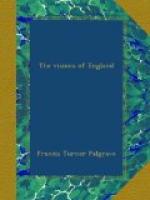Pride of Liguria’s shore
Genoa wrestles in vain;
Vainly Bohemia’s King
Kinglike is laid with the slain.
The Blood-lake is wiped-out in blood,
The shame of the centuries o’er;
Where the pride of the Norman had sway
The lions lord over the fray,
The legions of France are no more:—
—The Prince to his father kneels lowly;
—’His is the battle! his wholly!
For to-day is a day will be written in story
To the great world’s end, and for ever:—
So, let him have the spurs, and the glory!’
Erin and Gwalia; Half of Edward’s army consisted of light armed footmen from Ireland and Wales—the latter under their old Dragon-flag.
Chivalry; The feudal idea of an army, resting ’on the superiority of the horseman to the footman, of the mounted noble to the unmounted churl,’ may be said to have been ruined by this battle: (Green, B. IV: ch. iii).
Liguria; 15,000 cross-bowmen from Genoa were in Philip’s army.
The Blood-lake; Senlac; Hastings.
THE BLACK SEATS
1348-9
Blue and ever
more blue
The sky of that
summer’s spring:
No cloud from
dawning to night:
The lidless eyeball
of light
Glared: nor could e’en
in darkness the dew
Her pearls on
the meadow-grass string.
As a face of a
hundred years,
Mummied and scarr’d,
for the heart
Is long dry at
the fountain of tears,
Green earth lay
brown-faced and torn,
Scarr’d
and hard and forlorn.
And as that foul
monster of Lerna
Whom Heracles
slew in his might,
But this one slaying,
not slain,
From the marshes,
poisonous, white,
Crawl’d out a plague-mist
and sheeted the plain,
A hydra of hell
and of night.
—Whence upon men has
that horror past?
From Cathaya westward it stole to
Byzance,—
The City of Flowers,—the
vineyards of France;—
O’er the salt-sea ramparts
of England, last,
Reeking and rank, a serpent’s
breath:—
What is this, men cry in their fear, what is this
that cometh?
’Tis the
Black Death, they whisper:
The
black black Death!
The heart of man at the name
To a ball of ice shrinks in,
With hope, surrendering life:—
The husband looks on the wife,
Reading the tokens of doom in the frame,
The pest-boil hid in the skin,
And flees and leaves her to die.
Fear-sick, the mother beholds
In her child’s pure crystalline eye
A dull shining, a sign of despair.
Lo, the heavens are poison, not air;
And they fall as when lambs in the pasture
With a moan that is hardly a moan,
Drop, whole flocks, where they stand;
And the mother lays her, alone,
Slain by the touch of her nursing hand,
Where the household before her is strown.




